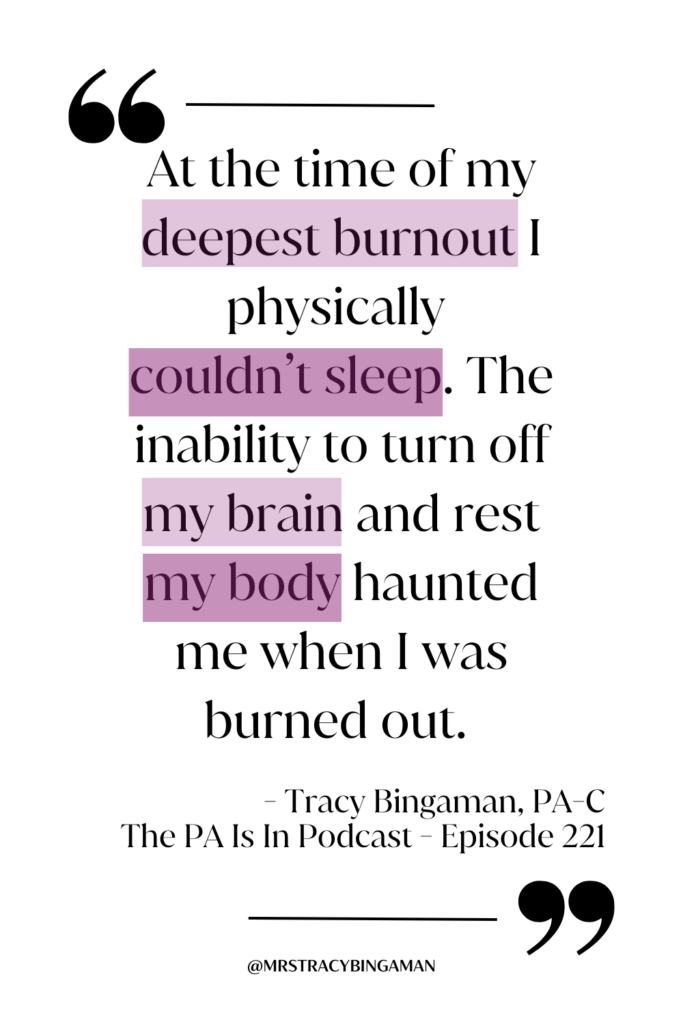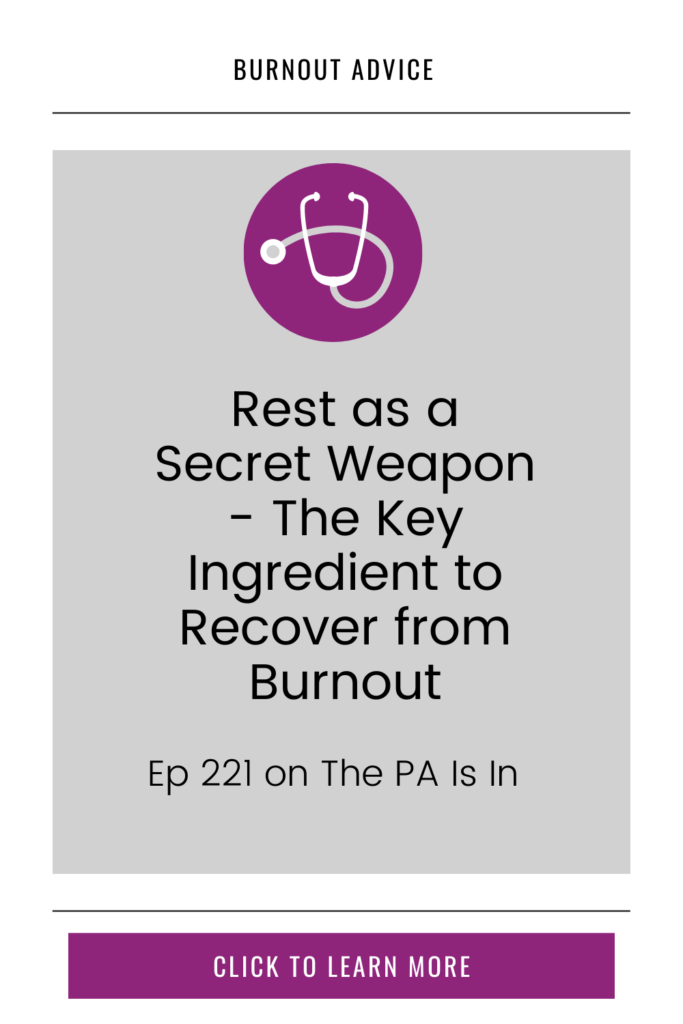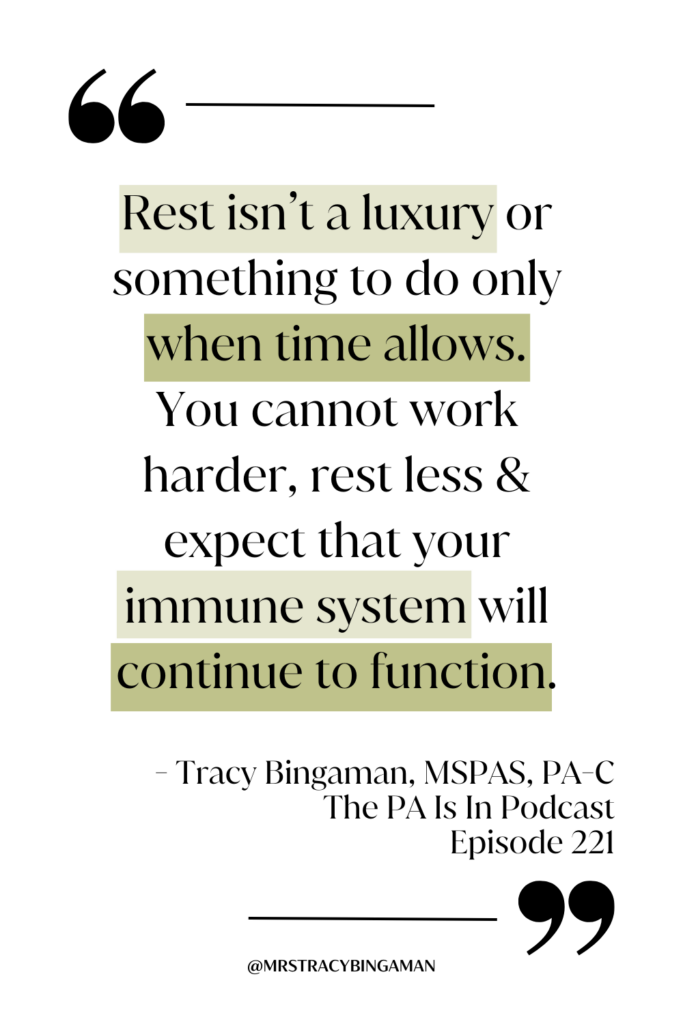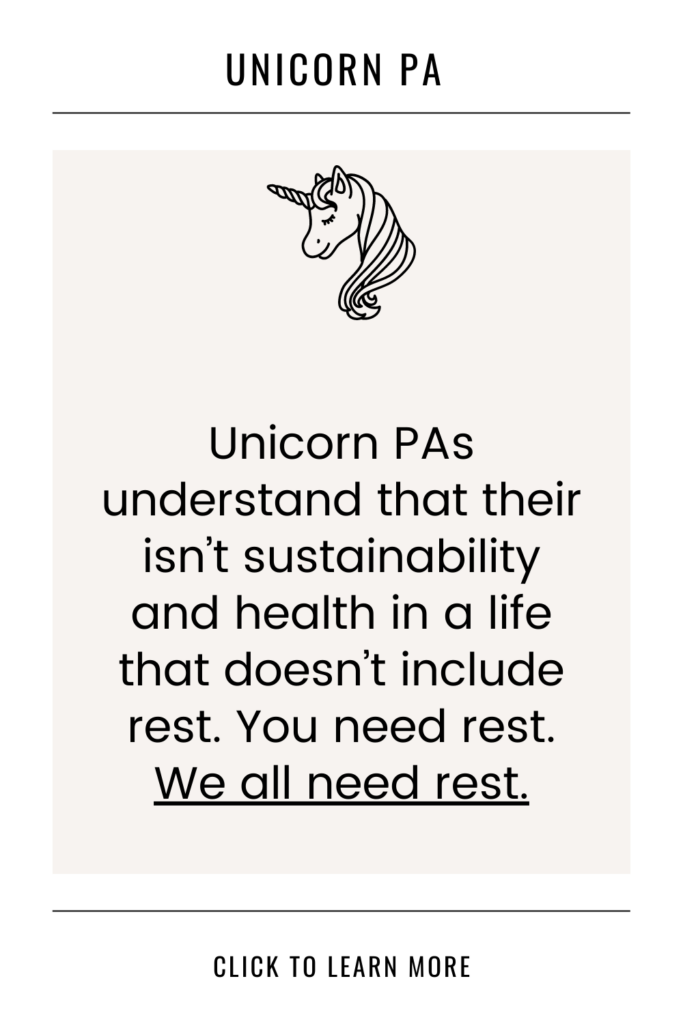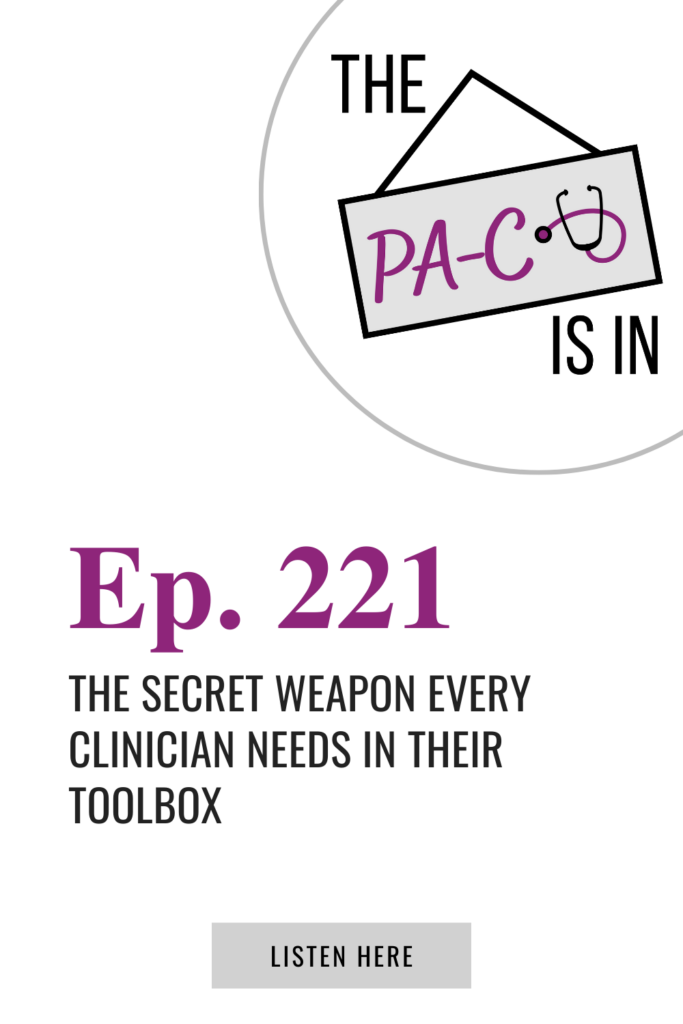When I went through burnout, my nervous system was shot. I was physically too wound up, too stuck in fight-or-flight to truly be able to rest.
Some people might look at that and think – wow, you must have been SO productive and to be honest… I was. If, at the time when I was burned out, someone asked for a report on, say, how many of our post prostatectomy patients experienced erectile dysfunction based on the XX symptom survey, I would have had it done in three days.
The problem? I wasn’t sleeping.
I wasn’t able to turn my brain off.
I wasn’t able to rest at all.
At that time, despite not being a caffeine drinker, I was as jittery as all get out.
I was jumpy, reactive, volatile and perpetually exhausted.
This episode of The PA Is In is a *candid* update on what I’ve learned in the past couple of years about rest.
My inability to rest, relax and recharge was not doing me any favors. I can see that now.
Watch on YouTube

The Importance of Rest
At the time of my deepest burnout I physically couldn’t sleep. This was a combination of the fact that each night at 2am I would wake up, worried about my patients and the fact that I was experiencing hyperthyroidism and associated tachycardia.
So, I would wake from a deep sleep, panicking about something from a work standpoint and, because my heart was racing, I would be unable to fall back asleep.
Ultimately I’d end up scrolling on my phone, checking the reply-all email that my surgeons would send at 3 in the morning to update about a septic patient who needed an emergent stent placement or the testicular torsion.
Inevitably the degree of stimulation and blue light would keep me up. My mind would be racing, dreading the next day at the hospital and letting tomorrow’s worries steal tonight’s peace.
Here we go with everything I’ve learned about rest in the three years since the depths of my burnout.
Lesson 1: Rest Isn’t Elective
One way that I’ve learned to reduce the significant profound overwhelm that resulted from my burnout is to realize that rest isn’t elective.
Rest isn’t a luxury or something to do only when time allows.
You cannot, in fact, work harder and harder, rest less and less and expect that your body, your brain and your immune system will continue to function.
During this time my immune system was simultaneously at an all time low and supercharged and attacking my own cells. I had a bout of pneumonia. I was diagnosed with autoimmune hyperthyroidism which resulted in profound tachycardia.
At the time my nervous system and immune system were so revved that I was practically vibrating. Regardless, rest was what I needed.
Lesson 2: It’s Important for Your Brain, Too.
Rest isn’t just for your body. Certainly I needed to rest my body, to tell my nervous system and immune system that all was well and it was safe, no tiger in sight – that there was no need to fight it or run.
Rest is vital for your mind to recover, too.
Studies show that we are more productive when we rest. It improves our executive cognitive function and means that we can think critically, problem solve, and make the decisions and diagnoses that our patients need from us.
Science has proved that stepping away, taking a rest and a break leads to:
Restored mental energy, enhanced focus, creativity and problem-solving.
Preventing burnout and increasing efficiency also result when you give yourself time and space.
It doesn’t have to be hour-long breaks. Short breaks, even 5-minutes at a time, for things like walking, stretching or taking deep breaths can lead to better productivity and happiness.
Lesson 3: Schedule It or It Won’t Happen
One of the most important things that I’ve learned in the last 3 years is that if it’s not scheduled it’s most likely not going to happen. With a busy household of 7 humans and 2 dogs there are a LOT of things that are on our calendar.
As someone who is prone to overcommitting, overworking and downright overthinking things… overscheduling is a big problem for me. I know that I need to actively block time.
Blocks of time for rest and downtime will prevent me from agreeing to take the kids on a playdate, sign up for volunteering or even commit to a social outing for Dan and I during a time when I think I’ll need rest.
For our family, this means setting aside one or two nights per week where we don’t commit to birthday parties or sporting events. I try to make sure to leave myself a good chunk of time on the weekends for accomplishing tasks and taking a break from getting things done.
I make sure to communicate with Dan when I am feeling the schedule get overwhelming. There is a sweet spot of enough activities for our kiddos sports and social lives but not so many that we are scattered and running here, there and everywhere each night of the week.
Sometimes scheduling this downtime and rest requires that I say no to things or ask others for help. My inclination is to be the default person for tasks and when I need a break, I have to remind myself that I’m not supposed to be an army of one.
This blocking of your schedule concept extends to work, too. Making sure you are using your PTO, blocking days well in advance and taking that time without guilt.
I once read a study that said that 55% of paid time off in the United States goes unused each year. Not taking your days of paid time off essentially means that your employer is saying “please, stay home today, we will pay you anyway” and you say “nah, I’m good, I’ll come in.”
Lesson 4: Rest Isn’t for the Weak or the Weary
What’s that saying? No rest for the weary?
Well, I’ve got news for you. Rest isn’t for the weak and it’s not only for the weary, either.
In order to function at 100%, to be firing on all cylinders, and to be the best version of you, you need rest.
That is true regardless of who you are and what commitments you’ve made.
Sometimes being able to get that rest means that you have to change plans.
I’ve found that making rest a part of the rhythm of life is the best way to create a sustainable pace for life and work.
The alternative is living a life of fits and spurts where sometimes you are sprinting and sometimes you’ve collapsed, unable to take a single step. I’ve been there and it’s as physically and emotionally exhausting as it sounds
Doing less and making time for rest paradoxically allows you to do the things that matter most well. It helps you to be able to be present, intentional and focused on those tasks, things, and people that matter most to you.
Lesson 5: Even Heroes Need Rest
Healthcare heroes is one of my least favorite phrases. When we were in the height of the pandemic and the community was rightly celebrating those who continued to go to work, risk their lives, care for patients suffering with COVID and other ailments, they coined the term healthcare heroes.
Healthcare workers and support staff were deemed heroes for risking their lives, for showing up, for doing their job.
But the thing about being coined as a hero is that it makes you sound superhuman. It draws to mind heroes like Wonder Woman, Superman, Ironman and the Flash. Beings that are larger than life with powers that are similarly too incredible to be true.
News flash: healthcare heroes are human beings.
They are not superhuman.
We are not superhuman.
We are human beings who require rest in order to function.
We may have been collectively painted with the brush of being super human and setting aside our fear during COVID, but we are in fact, human beings.
Our existence requires rest and recovery.
It doesn’t make you any less heroic to take a break and lean into the rest that your body is craving.
Why We Rest
Rest is one of the things that I’m still working on. That happens a lot with this show. I teach the things that I need a reminder of, myself.
I still find it hard to turn off my brain, remove distractions, and live in the moment.
I’m definitely sleeping better than during burnout, but occasionally I wake up with my mind racing.
Growth has occurred in listening to my body and figuring out how to avoid over scheduling and over commitment. I’m better at taking guilt-free paid time off.
Continued struggles in asking for help, but that’s coming along, too.
I hope this episode serves as a reminder to you that you are a human being who needs rest and recovery. You are a person first and a PA second.
You deserve R&R.
Pin for Later
